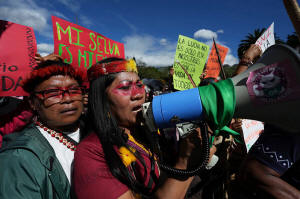Indigenous groups criticize Ecuador’s $47 billion oil expansion plan in
Amazon
[September 25, 2025] By
STEVEN GRATTAN
BOGOTA, Colombia (AP) — Seven Indigenous groups in Ecuador’s Amazon have
denounced a government plan to offer dozens of blocks of land for oil
exploration, saying it threatens their ancestral lands and violates
constitutional protections.
The criticism targets a plan from the Ministry of Energy and Mines in
August to auction the rights for 49 oil and gas projects worth more than
$47 billion.
Officials say the “hydrocarbon roadmap” is a strategy to modernize
Ecuador’s oil industry, attract foreign capital and boost production.
Their plan includes contract renegotiations and new licensing rounds
that the government says comply with existing legal frameworks.
Indigenous groups say 18 of the proposed oil blocks overlap their
territories — an area roughly the size of Belgium.
Leaders from the Andwa, Shuar, Achuar, Kichwa, Sapara, Shiwiar and
Waorani peoples say their communities were not consulted and accuse the
government of ignoring court rulings that struck down earlier
consultations as unconstitutional.
“The government is pushing ahead with plans to auction 18 oil blocks in
our ancestral territories without free, prior and informed consent. That
is a constitutional and international right the state is violating,”
said Nemo Guiquita, a Waorani leader with the Confederation of
Indigenous Nationalities of the Ecuadorian Amazon.
Several recent moves by President Daniel Noboa have alarmed
environmentalists and Indigenous leaders who say the country’s green
reputation is unraveling.

Noboa's administration has moved to scrap Ecuador's independent
Environment Ministry. He also supported a law passed by the National
Assembly that lets private and foreign entities co-manage conservation
zones that critics say weakens protections and threatens Indigenous land
rights.
“There have been protests, lawsuits and companies forced to withdraw in
the past, but now they are once again offering up Amazon oil fields,"
Guiquita said. "We are resisting, and we call on the international
community to oppose this expansion and help protect the Amazon and our
rights.”
Ecuador’s Ministry of Energy and Mines did not immediately respond to
questions from The Associated Press. The government has maintained that
a 2012 consultation remains valid and that the hydrocarbon plan follows
existing regulations.
The Noboa government has already opened new licensing rounds. In April
2025, international firms submitted bids for four oil blocks, and the
government said it planned further auctions in Amazon and sub-Andean
regions in late 2025 and 2026.
[to top of second column] |

Waorani Indigenous people march to the Constitutional Court to
protest for their right to consultation before the bidding for the
exploration and exploitation of oil and gas on their territory in
Quito, Ecuador, May 13, 2025. (AP Photo/Dolores Ochoa, File)
 “The Amazon is not for sale. We will
defend our territories because we have not been consulted — this is
our home,” said Nadino Calapucha, a Kichwa leader.
The dispute comes amid a state of emergency and a national strike
over fuel prices, extractive projects and the government’s failure
to honor a referendum limiting drilling in Yasuní National Park. On
Tuesday, farmers, Indigenous groups and transport unions clashed
with police outside the town of Tabacundo as nationwide protests
entered a second day.
“Ecuador already showed its will in the Yasuní referendum, when 59%
voted to keep oil in the ground. Yet the government insists on
imposing extraction, violating our rights,” Calapucha said.
Oil is Ecuador’s top export, accounting for about a third of
government revenue in some years. The country produces around
480,000 barrels per day, though output has declined over the past
decade. Successive governments have tried to lure foreign capital
into the Amazon, but projects have often stalled amid legal battles
and Indigenous resistance.
Noboa, who took office in late 2023, has staked much of his fiscal
plan on boosting resource revenues to stabilize public finances. His
administration is also promoting mining investment, drawing fire
from Indigenous leaders who say he is ignoring constitutional
guarantees of free, prior and informed consent.
“Ecuador’s plans to auction new oil blocks in the Amazon are doomed
to fail,” Kevin Koenig, Amazon Watch’s director for climate, energy
and extraction industry said. “Indigenous resistance, civil society
mobilization, and growing international pressure will continue to
expose these projects as illegitimate, unlawful, and unfinanceable.”
California’s state senate recently expressed concern over imports of
Amazon crude and approved a resolution to examine the state's role
as one of the world's top buyers, underscoring how Ecuador’s oil
strategy could reverberate beyond its borders.
All contents © copyright 2025 Associated Press. All rights reserved
 |